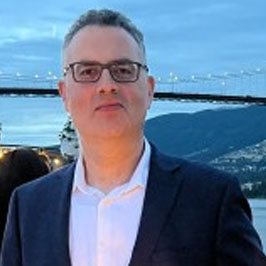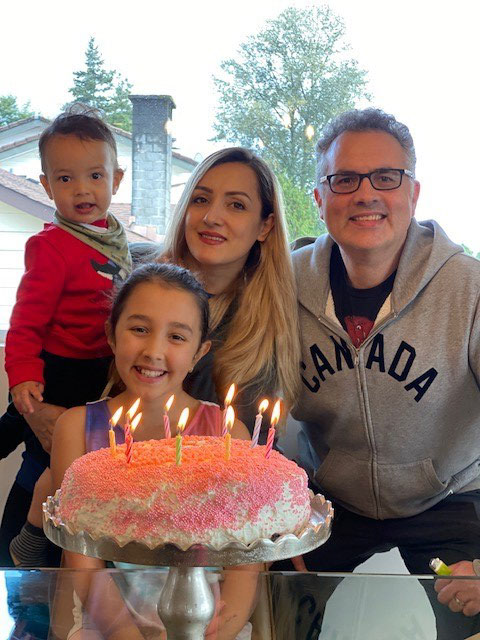
I am originally from Tehran, Iran. I was 14 years old when I came to Canada to stay with my brother, in order to study many years ago. At the time, the Iran/Iraq war was very much at its height. When my father saw that my 17-year-old uncle died in the war, he understood the urgency of the situation and decided to send me out of the country in a bid to join my brother who was a university student in Halifax, Nova Scotia. My journey to Canada included staying in Istanbul, Turkey and Hamburg, Germany for over a year. When I did manage to come to Canada, I applied for a Minster’s Permit to stay. As my brother was not able to fully support me at that time, I ended up in the foster care system for about two years, which at times proved challenging, but I learned to adjust and persevere. Placing a strong emphasis on education is not only part of our culture, but my personal upbringing.
I finished high school in Toronto and enrolled at the University of Toronto where I finished my Undergraduate and Master’s degrees. I then went on to do more research in the disciplines of Pharmacology and Critical Care Medicine at the Universities of Western Ontario and Texas A&M where I finished my PhD and post-doctoral fellowships. Doing research in the field of critical care medicine enabled me to see what some researching clinicians, including anesthesiologists, do. This interaction piqued my interest in clinical medicine. Hence, I applied to medical school at the University of Ottawa and graduated with a Doctor of Medicine degree in 2010. My meandering path to the field of Hematopathology included a stint in the blood bank at St. Paul’s hospital as an Anesthesiology resident at UBC. Understanding that the field of Hematopathology is the right field for me took some soul searching, but I am so glad I did make this switch - the rest of it is history. I finished the Hematopathology residency at UBC and I am now a practicing Hematopathologist at Fraser Health. I am married and have two kids. When I am not doing what I love during the work hours, you can find me with hanging out with my kids!

I am a Clinical Assistant Professor at the Faculty of Medicine. In addition to my clinical and administrative duties, I am involved in teaching Hematopathology, Transfusion Medicine, Hemoglobinopathy and other related disciplines to medical students, residents and fellows. I am also involved in teaching the Bachelor of Science in Laboratory Medicine students.
The field of pathology is very visual. In the most basic sense, I love the classic microscope findings that we look for in our work. If I find a very good example of a pathological finding, I get excited about taking pictures and sharing it to the greater Pathology community (colleagues, but also rotating medical students, residents, fellows and other learners). Finding rare cases is exhilarating for me. I love publishing case reports and have been active in disseminating interesting cases/discipline knowledge in this way.
A second aspect of my work that I enjoy pertains to interaction with patients. I think in the broad field of Pathology, the discipline of Hematopathology is the most clinically oriented. When I procure a bone marrow biopsy, I love talking to my patients, getting to know them, and trying to ameliorate their anxiety. Specifically, I try to engage my patients, coaching them with breathing exercises throughout the procedure that gets them through it. A successful biopsy in a patient who does not suffer is very satisfying for me. In both residency and in my practice as staff, I received letters from my patients who were appreciative of my efforts. I cherish these.
Working in a busy hospital can sometimes be difficult. Being a doctor’s doctor (e.g. consultant to Surgeons, Pediatricians, Hematologists, Anesthesiologists, Internists etc.), we have a tendency to get interrupted a lot. Sometimes I find myself mulling over a report for several hours; being interrupted by technologists, visiting clinicians, administrative staff etc. The upside is that you are never bored and always have a problem to solve! Another aspect of my work that can be challenging is procuring a bone marrow biopsy in a technically difficult patient. However, learning from the best in our training program has prepared me well for the difficult biopsy!
First and foremost, I like getting medical students interested in hematology/hematopathology. Having had to switch one residency to another, I know that the residency experience may not be very easy or smooth. If I see a student who might be struggling, I try to help them by identifying their shortcomings and mutually coming up with tangible solutions that can improve their performance. I believe in the reverse classroom model. When a learner is spending a day with me, I try to gage their knowledge base and encourage independent learning. Then I attempt to fill any knowledge gaps that they may have by showing the person the worked up case. I find this to be effective for knowledge retention.
There are many candidates in this category, including my mother, who is my hero. However, I should say the single most influential person in my life has been my late father. He instilled in me the value of perseverance, tenacity, hope, and hard work. This has been a guiding map for me in my life. I try my best to impart these values to my own children.
Don’t be a tourist in your course of study. What I mean by this is that you need to be an active learner. Use your time wisely. Don’t wait for the answers in a case from your preceptor. Look them up as if YOU are the consultant. This is conducive to best way of learning. Read widely and around the cases.
I have been lucky to have a wonderful group of colleagues that have been supporting me from day one. I find this to be the single most important factor in initiating a successful career. Use your colleagues as a resource. They have a wealth of information that they are more than happy to share with you. Reciprocity is key, however. I prioritize being helpful to any and everyone who asks for my help. I find this behavior breeds trust, comradery and good will. Do this, and you will find your colleagues in your corner.
I have lived in several parts of the world. Where we live is hands down one of the most beautiful places on this earth. There are many stunning places that I have visited in BC. Tofino and Parksville are some of my most favorite spots that I have been. As a family, we love the ferry trip. When we visited Parksville, I was amazed by the tide and how far the water recedes in the mornings. It is fascinating. The beauty of nature in this province is breathtaking.
In addition to my clinical and administrative duties (I am the Transfusion Service and the Department head at Burnaby and Langley Memorial Hospitals respectively), I have been active in publishing articles in reputable journal in the last four years.